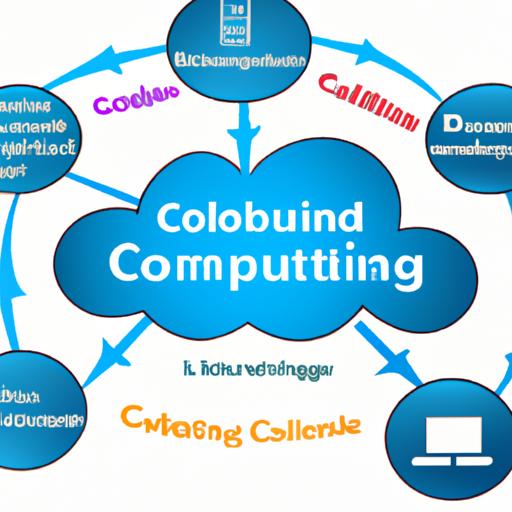Key Features of Cloud Solutions

Cloud solutions offer a multitude of features that make them highly advantageous in today’s digital landscape. Let’s explore some of the key features that make cloud solutions a popular choice for businesses and individuals alike.
A. Scalability and Flexibility
One of the primary attractions of cloud solutions is their scalability and flexibility. With cloud computing, you have the ability to scale your resources up or down based on your needs. Whether you need additional storage space, computing power, or bandwidth, cloud solutions can easily accommodate your requirements. This scalability ensures that you only pay for the resources you use, allowing for cost optimization and efficient resource allocation.
Cloud solutions also provide the flexibility to access your data and applications from anywhere, at any time. Whether you’re working from your office, home, or on the go, all you need is an internet connection and a device to access your cloud resources. This level of flexibility empowers businesses to have a distributed workforce and enables seamless collaboration between team members across different locations.
B. Cost-effectiveness
Cloud solutions offer cost-effective alternatives to traditional IT infrastructures. Instead of investing in expensive hardware, software licenses, and dedicated IT personnel, cloud solutions allow businesses to pay for services on a subscription basis. This eliminates the need for upfront capital expenditures and reduces ongoing maintenance costs. Additionally, cloud solutions offer pay-as-you-go pricing models, enabling businesses to scale their expenses based on their usage, further optimizing cost-efficiency.
C. Data Security and Privacy
Maintaining data security and privacy is a top priority for businesses in the digital age. Cloud solutions provide robust security measures to protect your data from unauthorized access, loss, or theft. Cloud providers employ advanced encryption techniques, access controls, and regular data backups to ensure the integrity and confidentiality of your information. Additionally, reputable cloud providers comply with industry-standard security certifications and regulatory requirements, instilling trust and confidence in their services.
D. Easy Accessibility and Collaboration
Cloud solutions facilitate easy accessibility to your data and applications from different devices and locations. This accessibility promotes seamless collaboration among team members, even when working remotely. Cloud-based collaboration tools allow for real-time document sharing, editing, and version control, enhancing productivity and efficiency. With cloud solutions, you can break free from the limitations of physical infrastructure and work together seamlessly, regardless of geographical boundaries.
In the next section, we will explore the common applications of cloud solutions and how they can benefit businesses and individuals.
Common Applications of Cloud Solutions
Cloud solutions have revolutionized the way we store, share, and collaborate on digital content. Let’s explore some of the common applications where cloud solutions have become indispensable.
A. Cloud storage and file sharing
Cloud storage is a convenient and secure way to store files and data remotely, eliminating the need for physical storage devices. With cloud storage, you can access your files from anywhere, at any time, using any device with an internet connection. Whether you are a student, professional, or business owner, cloud storage offers a scalable solution to manage and organize your digital assets. Popular cloud storage providers such as Dropbox, Google Drive, and Microsoft OneDrive offer various plans to suit different storage needs.
File sharing is another essential feature of cloud solutions, enabling seamless collaboration and document exchange. Instead of sending large files via email or physical storage devices, cloud-based file sharing allows you to share files with others by providing them with secure access links. This simplifies workflows and enhances productivity, especially in remote work environments. Services like WeTransfer and Box provide efficient file sharing capabilities, ensuring that your files are easily accessible and protected.
B. Cloud-based software and applications
Cloud-based software and applications have gained immense popularity due to their flexibility, scalability, and cost-effectiveness. Instead of installing software on individual devices, cloud-based solutions allow you to access applications directly through a web browser. This eliminates the need for constant updates and maintenance, as the software provider handles all the technical aspects.
From project management tools like Trello and Asana to customer relationship management (CRM) systems like Salesforce, cloud-based software provides businesses with efficient and collaborative solutions. The ability to access these applications from any device enables teams to work together seamlessly, regardless of their physical location. Cloud-based applications also offer automatic backups and updates, ensuring that you always have the latest features and security patches.
C. Cloud-based communication and collaboration tools
Cloud solutions have revolutionized communication and collaboration by providing a range of tools that facilitate real-time interaction and teamwork. Video conferencing platforms like Zoom and Microsoft Teams have become essential for remote meetings, allowing participants to connect face-to-face from different locations. Cloud-based communication tools also offer features like screen sharing, chat functions, and file sharing, enhancing collaboration and information exchange.
Collaboration platforms like Google Workspace (formerly G Suite) and Microsoft 365 provide integrated solutions for document creation, editing, and collaboration in real-time. These tools enable multiple users to work on the same document simultaneously, eliminating version control issues and streamlining workflows. With cloud-based communication and collaboration tools, teams can work together efficiently, regardless of geographical constraints.
In the next section, we will discuss the factors that should be considered when choosing a cloud solution. Stay tuned!
Go to Section 5 – Factors to Consider When Choosing a Cloud Solution
Factors to Consider When Choosing a Cloud Solution
Choosing the right cloud solution for your business requires careful evaluation of various factors. To ensure you make an informed decision, consider the following key factors:
A. Security measures and certifications
When it comes to cloud solutions, data security is of paramount importance. Look for providers that offer robust security measures such as encryption, access controls, and regular security audits. Additionally, consider the certifications and compliance standards the cloud provider adheres to, such as ISO 27001 or SOC 2, to ensure they meet industry best practices and regulatory requirements.
B. Scalability and performance
As your business grows, it is crucial to have a cloud solution that can scale with your needs. Evaluate the provider’s ability to handle increased workloads and accommodate your future growth. Additionally, consider the performance metrics, such as response time and uptime guarantees, to ensure that the cloud solution can meet your performance requirements without interruptions.
C. Cost and pricing models
Cloud solutions come with various pricing models, such as pay-as-you-go or subscription-based plans. Evaluate your budget and determine which pricing model aligns best with your business requirements. Consider factors like storage costs, data transfer fees, and potential additional charges for extra services or resources.
D. Integration capabilities with existing systems
Ensure that the cloud solution you choose can seamlessly integrate with your existing IT infrastructure and applications. Compatibility and ease of integration are crucial for a smooth transition and efficient operation. Consider the availability of APIs, pre-built connectors, and support for industry-standard protocols to facilitate integration with your current systems.
By carefully evaluating these factors, you can select a cloud solution that meets your business needs, provides robust security, scales with your growth, offers a suitable pricing structure, and integrates seamlessly with your existing systems.


